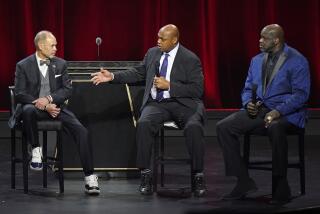Give the telcos a video hook-up
LIKE LUCY URGING CHARLIE BROWN to take another run at the football, telephone companies are saying that they really mean it this time. They promise to hold the ball steady — that is, to play nice with the public — if only lawmakers will agree to let them in the game.
The game here, broadly speaking, is TV service. The telecoms want to offer an alternative to cable and satellite TV. These are the same companies that persuaded Congress to rewrite telecommunications law in 1996 to let them compete in the long-distance market. Instead of vying for customers with the leading long-distance companies, however, the regional Bells gobbled up most of them. Meanwhile, the Bells abandoned the fledgling TV services they’d launched in numerous states, saying the effort was too costly.
Still, there’s reason to believe the Bells are serious this time. With upgraded cable systems reaching more than 90% of U.S. homes, cable operators are leading the high-speed Internet market and gaining a foothold in phone service. The Bells have responded by offering packages of phone, Internet and satellite TV service, but that’s just a quick fix. What they want is to own and operate the service themselves.
So what’s stopping them? Mainly it’s the cost of building the network needed to transmit digitized video over the phone lines. But the telecoms say they’re ready to spend billions of dollars on upgrades; what’s gumming up the works, they say, is local governments’ insistence that they obtain the right to sell TV programming through their wires. They want the feds to give them a national franchise that would let them introduce TV service wherever they choose. Failing that, they’ve asked California and other states to provide a statewide franchise.
The prospect of providing more competition to the local cable TV operator is so enticing, it’s tempting to forget all those times the Bells yanked the ball away. They’re certainly right about the need to streamline the franchising process, which can stretch on for years as cities demand a profusion of public-access channels, TV studios and other perks. A better approach would be to create a package of public benefits that telecoms and cable operators would have to provide, tied to the size of the community served.
And as long as they don’t discriminate within neighborhoods, the telecoms should be free to pick the communities where they compete for customers for these new services, just as cable operators choose where they offer telephone and data services. Widespread demand — more than 80% of U.S. households pay for cable or satellite TV today — should draw the telecoms’ new service to lower-income markets. So too should the competitive threat posed by the cable operators’ expanding phone services.
Still, given the Bells’ track record, lawmakers should be careful not to give telecoms and cable operators carte blanche. With the issue bogging down in Congress, chances are that Sacramento will move on a bill, coauthored by Assembly Speaker Fabian Nuñez (D-Los Angeles), that would allow them into the market for TV services before Washington acts. Here’s hoping that Californians actually get to kick the football.
More to Read
Start your day right
Sign up for Essential California for news, features and recommendations from the L.A. Times and beyond in your inbox six days a week.
You may occasionally receive promotional content from the Los Angeles Times.






